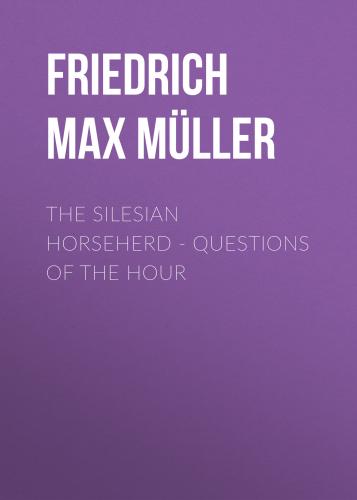“All my life I have been engaged in investigating the past; I am a philologist and have therefore been also a student of history, have especially studied the historical development of the various religions of mankind, and to this end have had to make a study of ancient languages, particularly Oriental languages. When one consecrates one's life to such a cause, one acquires an interest in and a love for the ancients, and a wish to know what has consoled them in this vale of grief. As you probably acquired a love for your colts, mares, and stallions, I acquired an interest in ancient and modern religions. And as you probably do not immediately kill or reject your horses because they possess a blemish, shy, kick, prance about, etc., so I do not immediately destroy all beliefs, and least of all my own mount, because they are not faultless, occasionally leave me in the lurch, behave foolishly, even dance on their hind legs with head in air; but I endeavour to understand them. When we understand even a little, we can forgive much. That many religions, including our own, contain errors and weak points, just as your horses do, I know perhaps even better than you. But have you ever asked yourself, what would have become of mankind without any religion, without the conviction that beyond our horizon, that is beyond our limit, there still must be something? You will answer, ‘How do we know that?’ Well, can there be any boundary without something beyond it? Is not that as true as any theorem in geometry? If it were not so, how could we explain the fact that mankind has never been without a belief in a world beyond, nor without religion, either in the lowest or in the highest levels.
“This horizon, this boundary, does not relate only to space, as all will agree, even when carried beyond the Milky Way; it relates as well to time. You assert, ‘The world is much older than we suppose;’ you are right, but if it were a million years, still there must have been a time before it was even a day old. That also is indisputable. But when we reach the limit of our senses and our understanding, then the horse shies, then we imagine that nothing can go beyond our understanding. Now let us begin with our five senses. They seem to be our wings, but seen in the light they are our fetters, our prison walls. All our senses have their horizon and their limits; and the limits in the external world are our making. Our sight scarcely reaches a mile, then it ceases; we can observe the movement of the second hand, but that of the minute hand escapes us. Why? We might know that a cannon-ball passes through our field of vision, but we cannot locate it. Why not? Our sense of touch is also very weak and only extends over a very limited space. And as it is on the large scale, so is it with the small. We see the eye of a needle, but infusoria and bacteria, which we know to be there and which affect us so much, we cannot see. With telescopes and microscopes we can slightly extend the field of our perception, but the limitations and weakness of our sense-impressions remain none the less an undeniable fact. We live in a prison, in a cave as Plato said, and yet we accept our impressions as they are, and form out of them general notions and words, and with these words we erect this stately building, or this tower of Babel, which we then call human science.
“Yes, say certain philosophers, our senses may be finite and untrustworthy, but our understanding, and still further our reason, they are unlimited, and recognise nothing which is beyond them. Well, what does this most wise understanding do for us? Has not Hobbes long since taught us that it adds and subtracts, and voilà tout? It receives the impressions of the senses, combines them, feels them, comprehends and designates or names them after any characteristic, and when man has found words, then the adding and subtracting begin, but unfortunately also the jumbling and chattering, till we finally establish that philosophy and religion, which have aroused in so great degree your anger, and even your blood thirstiness. In spite of all it remains true that we can no more get beyond the horizon of our senses than we can jump out of our skins. You know that old saying of Locke's, although it is much older than Locke, that there is nothing in our intellect which was not first in our senses. And therefore, however much we may extend our knowledge by adding and subtracting, everywhere we feel in the end our horizon, our limitations, our ignorance, for with the limitations of our senses it cannot be otherwise. Invariably we receive the old answer, ‘You are like the mind which you conceive, not me.’
Конец ознакомительного фрагмента.
Текст предоставлен ООО «ЛитРес».
Прочитайте эту книгу целиком, купив полную легальную версию на ЛитРес.
Безопасно оплатить книгу можно банковской картой Visa, MasterCard, Maestro, со счета мобильного телефона, с платежного терминала, в салоне МТС или Связной, через PayPal, WebMoney, Яндекс.Деньги, QIWI Кошелек, бонусными картами или другим удобным Вам способом.
